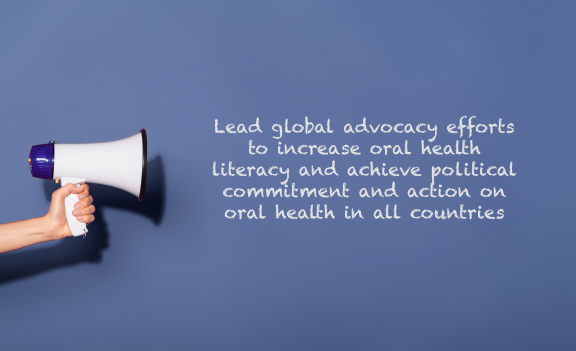Advocacy strategy
Securing oral health for all
Oral diseases affect more than 3.7 billion people and are amongst the most common health conditions – as well as most prevalent noncommunicable disease (NCD) – globally. They disproportionately impact those from low- and middle-income countries and marginalized groups. Billions of people have no sustained and affordable access to even basic oral healthcare. FDI’s advocacy strategy aims to change this.
Goals
FDI’s advocacy strategy positions oral health as being essential to general health and well-being. It focuses attention on the fact that achieving better oral health through integration with NCD and Universal Health Coverage (UHC) agendas is critical to the successful delivery of the United Nations Sustainable Development Goals (SDGs).
The strategy is built around three goals aimed at delivering on the overarching organizational goal to:

Goal 1
Ensure oral health is recognized and accepted as a core element of general health and well-being
Goal 2
Integrate oral health into prevention and treatment of other NCDs
Goal 3
Mobilize members to build national capacity to effectively influence and shape oral health priorities on a global scale
FDI and our members have played a leading role in accelerating action for oral health. Together, we have achieved a series of significant advocacy wins to advance progress on the prevention and control of oral disease and the promotion of oral health:
- Worked with member associations to successfully advocate for oral health to be included within the United Nations (UN) Political Declarations on the Prevention and Control of NCDs and Universal Health Coverage.
- Played a key role in the negotiations to ensure the phase-down rather than phase-out of dental amalgam within the Minamata Convention of Mercury.
- Built key strategic partnerships to integrate oral health into the broader NCD agenda.
- Mobilized FDI member associations by equipping them with the tools and resources to advocate at a national level.
- Developed a new definition of oral health and a measurement tool to unite the global health community under a common language when referring to, and monitoring progress in, oral health.
A key outcome of FDI’s advocacy work was developing a new definition of oral health. With a universally understood definition of oral health, patients, policymakers, oral health professionals and other stakeholders can approach this topic in a united way.
A common understanding of oral health, by using consistent language to refer to it, also helps to raise awareness in communities, guides oral health professionals, and encourages effective preventive care and treatment.
Download the definition and companion framework
- Oral Health Definition Executive Summary.
- Glick M, Williams DM, Kleinman DV, Vujicic M, Watt RG, Weyant RJ. A new definition for oral health developed by the FDI World Dental Federation opens the door to a universal definition of oral health. Int Dent J. 2016; 66:322–324. Available here.
- Definition available in multiple languages.
FDI’s definition of oral health paved the way for a standardized oral health assessment and measurement tool to be developed, and this was done in in partnership with the International Consortium for Health Outcomes Measurement (ICHOM). FDI together with ICHOM developed baselines and indicators to measure oral health outcomes globally – referred to as the Adult Oral Health Standard Set (AOHSS) – and for use in clinical practice, research, advocacy and population health.
It is important to monitor change in oral health status across all populations. Oral diseases directly impact the lives of individuals by causing considerable pain and suffering, altering food choices, affecting speech, self‐esteem, quality of life, and participation in everyday activities.
Measuring the impact of oral diseases has traditionally been based upon the biomedical model that provides only limited insight into the impact of oral disease on people’s lives. The emerging patient‐centred care model necessitates a focus on oral health rather than oral disease. Although measures of oral health and oral health‐related quality of life have been developed, they have not been shown to be useful in all the important domains of clinical practice, health services research, epidemiology, and advocacy.
From the patient‐centred care perspective, oral healthcare providers should thus consider not only disease processes, but also the environmental, social and personal factors, overall quality of life and participation in all major life areas, including making decisions about and control over their health and the use of health services. This approach is reflected in FDI ‘s definition of oral health and provides a theoretical framework for shared decision‐making in clinical practice, as well as for health services research, epidemiology and advocacy.
Integral to FDI’s Advocacy strategy is Vision 2030: Delivering Optimal Oral Health for All (Vision 2030). Launched in January 2021, the report identifies challenges that will confront dentistry and the oral health community over the next decade and it proposes strategies for how these can be turned into opportunities to improve oral health, reduce oral health inequalities, and contribute to reducing the global burden of oral diseases.
Vision 2030 aims to assist the profession in realizing delivery of optimal oral health to all – with no person left behind. The report is constructed around three pillars, each with a major goal. These pillars are supported by a strategy for education that will create a responsive and resilient profession, with the knowledge and skills to lead systems reforms.

